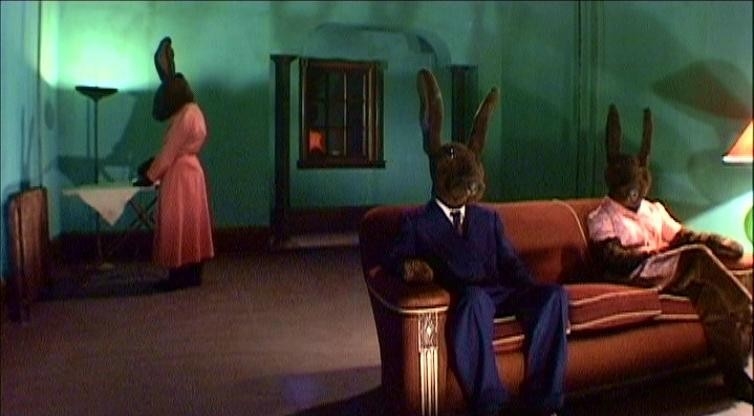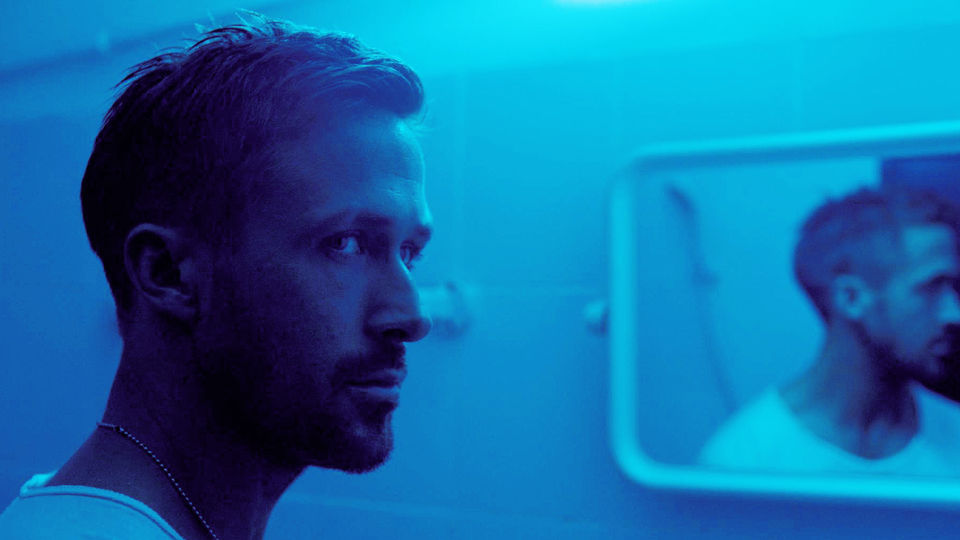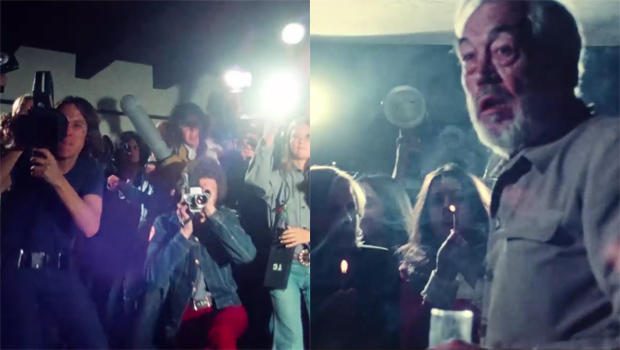6. Domino (2005)

When Domino was released it was met with nothing but hatred, and it is still to this day remembered by most as a failed experiment by Tony Scott to find out how far is way too far in terms of style, and it is true that the style can sometimes be a bit excessive but it’s never to the detrimental of the subject matter, if anything it enhances it to a unique level of greatness, a level where style and substance merge into one and become so co-dependent on each other that one can’t really work without the other.
The story of Domino Harvey could have been told in a more conventional style with a normal three-act structure and some more basic filmmaking techniques but then it would have lost all of the life and energy that Tony worked so hard to achieve. Every single choice he made is very deliberate and is a visual presentation of the character’s mental state.
The film tells a made-up story based on the real-life story of Model turned Bounty Hunter Domino Harvey (the daughter of Laurence Harvey), most of the character’s, the backstory and concept is based on real life events but the story itself about a simple mission gone wrong in the worst ways possible is entirely made up.
The film is brilliantly written by the highly underrated Richard Kelly (The Director of Donnie Darko (a Cult Classic), Southland Tales (a Masterpiece) and The Box (pretty damn great)) who spins a beautifully complex non-linear web that only becomes more and more complex and convoluted the further you go into it, and it perfectly suits Tony Scott’s magnificently Excessive style.
It’s such a brilliant combination of Tony Scott’s unique style and Richard Kelly’s masterful control over intentionally convoluted stories that it really is a one-of-a-kind film that can never be replicated and will hopefully get the critical re-evaluation it deserves sometime in the near future, because this film really is a unique Masterwork of one of modern Cinema’s greatest visual stylist’s.
There will always be some haters, but based on how unique, entertaining and rewatchable this film is it’s not that surprising that it has since gained a cult following that has slowly been growing since 2005 and will one day hopefully become so big that this film will ascend into its rightful place in the pantheon of great movies, just like what happened for Eraserhead, Donnie Darko and pretty much every 70’s and 80’s film by David Cronenberg.
7. Inland Empire (2006)

Inland Empire is probably David Lynch’s most underrated work, everybody loves films like Erasrhead, Mulholland Drive, Blue Velvet, Lost Highway and Twin Peaks, but Inland Empire is just so weird and so long that it isn’t everyone’s cup of tea.
Inland Empire kind of tells the tale of an actress that signs up for a new film and then finds out it’s actually a remake of an unfinished Polish film that went unfinished after the two main actors were brutally murdered, but that is actually just the story of the first 30 to 40 minutes, after that reality caves in on itself, character’s start drifting between identities, stories, worlds and even dimensions. After a certain point the film becomes a string of intercut unrelated nightmarish sequences that are always captivating but never really cohere into anything other than a terrifying chaos of dream-like Images.
The film obliterates any notions of conventional narratives in favour of a waking nightmare, there really is no way of explaining what happens, it just does and it continues to do so until it ends three hours later, it’s the cinematic equivalent of having a complete mental breakdown. It’s everything he was trying out and experimenting with in Eraserhead taken to its fullest potential in the most extreme way possible.
This film feels like the culmination of David Lynch’s entire career, both in how it mirrors Eraserhead and how it incorporates almost every single theme and idea Lynch had played with in everything he had made since. Both Inland Empire and Eraserhead were independently produced passion projects that were four years in the making, both feel like waking nightmares and are pretty much impossible to understand. And even though Twin Peaks: The Return might be the last Feature Length thing he directs Inland Empire feels like his Swansong, his Magnum Opus, his ultimate Masterpiece.
And to no one’s surprise no one really knew what to make of it when it was released, and based on the great reception that Twin Peaks: The Return got, I think it’s safe to say that if this film had been released now instead of 2006 that it would have rocked the world in a very similar way, thus definitively proving that Inland Empire is a film way ahead of its time.
8. Only God Forgives (2013)

Only God Forgives is kind of a strange case, when it was released it was pretty much hated because it wasn’t another Drive (2011) like everyone was expecting. Nicolas Winding Refn had been directing films since 1998 at that point but Drive was really the first time he exploded into the mainstream.
The Pusher Trilogy had gained him some notoriety, the same with Valhalla Rising and Bronson, but it was Drive that put him on the map, and most people unfamiliar with his filmography were expecting his next team-up with Ryan Gosling to be more of the same. So when they got a weird slow-burn dream-like fairy tale about revenge people were obviously confused and didn’t really know what to make of it.
But in the years since its release the tide has slowly begun turning, the hatred and confusion has begun to wash away and more and more people are realizing that what we got was actually a unique Masterpiece.
The story is quite simple but full of complex buried emotions birthed out of extreme trauma, presented to us as a slow-burn neon-bathed mood-piece with a heightened reality and fairy tale like storytelling, and most likely this is probably just the beginning of its critical re-evaluation.
9. Nymphomaniac (2013)

Lars Von Trier is a Controversial figure, you either love him or you hate him, and the same goes for Nymphomaniac, you either think it’s an absolutely brilliant Epic Masterpiece or you think it’s a self-indulgent pretentious shitfest.
Nymphomaniac tells the story is Joe, a Nymphomaniac, that is found one day beaten unconscious in an alley by Seligman, a good-hearted loner that takes her in to his home to care for her, Joe then decides to tell Seligman her lives story to prove to him that she’s a sinful being and a down-right evil person.
In its uncut director’s cut form (the only way it should be watched) the film is 325-minute-long (and you probably thought that Dr. Mabuse was going to be the longest film on this list) and it’s so brilliantly constructed that it never becomes boring and never feels overlong, and for an over five-hour long film it’s also weirdly rewatchable. The story is never anything less than captivating and it’s all building up to one of the greatest and boldest endings of the 20th century, an ending that has and will always piss some people off and will leave others both shocked and with a huge grin stuck to their face.
The film was quite controversial for its portrayal of sex, something that’s still a big taboo in modern society, but the sex parts of Nymphomaniac were never the most controversial or shocking parts of the film, as the most controversial parts where some of the opinions and ideas that Lars was presenting, like in a scene where he calls Paedophiles that don’t act on their sexual urges hero’s that deserve to be given medals, a scene that is quite interesting because it forces you to look into a mind completely different from your own and show you some really out-there and sometimes down-right offensive opinions presented in such a well-argued way that you are basically forced to admit that he has a few good points even if you fundamentally disagree with what he is saying.
But those controversial opinions are a big part of what makes this film a Masterpiece, because it continually gives you stuff to think about that forced you into some pretty complex mental gymnastics over your own opinion on the stuff he’s talking about.
It’s a 325-minute-long dark and fucked up intellectual exercise with Sex and Humour thrown-in every now and then to lighten the mood. It’s equal parts compelling, thrilling, hilarious, offensive, thought-provoking, traumatic and tragic. It’s everything we’ve come to expect from Lars Von Trier put on a more Massive and Sprawling scale, an Epic that only Lars Von Trier could (and would) make.
10. The Other Side of the Wind (2018)

The Other Side of the Wind is technically the newest film on this list, it’s a film 48 years in the making, filmed over the period of six years in the 70’s but through financial and legal issues it wasn’t finished until 2018 (33 years after Orson’s death) when it was acquired and completed by Netflix.
The film is a Cinephile’s wet dream, a film by one of the greatest director’s ever, a film that was once thought would never be finished and would never see the light of day, a film that works as a unique mirror to Citizen Kane Narrative-wise and shows just how much Orson had changed and developed as a director since his debut, a film that has a production history that’s just as interesting as everything on screen and where knowing the production history enriches the film even more, a film that pretty much predicted the popularity of the mockumentary style of filmmaking found in shows like The Office and Modern Family, all of this rolled into one brilliantly chaotic and insane package that will stay with you long after the films over.
Had the film be released in the 70’s it would have been a really influential film that would today be considered a highly innovative classic and a brilliant swansong for one of our most unique directors, and even today, 48 years later, it still feels innovative, both stylistically and narratively. And in a weird twist of fate the film was met with a weirdly uneven reception, some people think it’s a brilliant piece of work that perfectly caps off Orson Welles directorial career while others think it’s a jumbled mess that should have stayed unfinished.
But no matter what our opinions of the film are the fact that this film was even released as an important (even historic) event in history of cinema and kind of a miracle. It may be too early to fully say if the film is indeed a masterpiece worthy to be put on the same podium as Citizen Kane, Touch of Evil, The Trial and F for Fake, but no one can deny that The Other Side of the Wind was a film way ahead of its time, even if it’s also a film Out of time, and it can now finally begin the same journey that every other film on this list has either already entered, completed or halfway completed, a journey that we are lucky to be capable witness first-hand and participate in for the next few years, or decades.